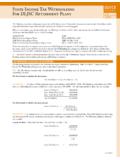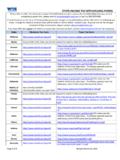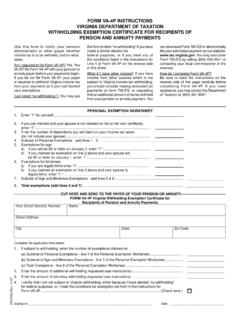Transcription of State Income Taxes: Are You Withholding Correctly?
1 State Income Taxes: Are You Withholding correctly ? Steve Hodgson, CPP, CPLP. Director of Payroll Training American Payroll Association 660 North Main Avenue, Suite 100. San Antonio, TX 78205-1217 Phone: (210) 224-6406. API Fund for Payroll Education, Inc. Steven W. Hodgson, CPP, CPLP. Director of Payroll Training American Payroll Association Steve Hodgson currently serves as Director of Payroll Training for the American Payroll Association. His responsibilities include the development, review and presentation of APA training courses. He recently earned ATD's Certified Professional in Learning and Performance (CPLP) designation in February 2017.
2 Previously, he coordinated speakers for APA conferences, seminars and other meetings as the Director of Speaker Administration. A payroll practitioner for 25 years, Steve was formerly the HRIS/Payroll Manager for BBA Fiberweb in Simpsonville, SC and served on the Client Advisory Board of Unicorn HRO, the company's payroll software provider. Before joining the APA staff, Steve was an active member of the association. He served on the APA President's Board of Advisors, the Board of Contributing Writers, and the National Speakers Bureau. He received APA's Meritorious Service Award in 2004. On the local level, Steve served as Secretary and Vice President of the South Carolina Chapter.
3 He was instrumental in bringing the Payroll Professional Learning Series to Greenville Technical College as an instructor. He was named SC Payroll Professional of the Year in 2002. 2. Multi- State Income Taxation: For Which State Must You Withhold? If your company has operations in more than one State , you may be faced with Income tax Withholding for more than one State . Sometimes, you may even have to withhold Income tax for more than one State from the same employee. Withholding can get even more complicated when you have employees who live in a different State than the one they work in or who perform services in more than one State .
4 Deciding which State 's Income tax to withhold can be a confusing process. How do you determine who is a resident and whether you should follow the laws of the State of residence or the laws of the State in which services are performed? Not all states answer these basic questions in the same way and, sometimes, State laws conflict. Even the simple word operations, as used in the paragraph above, is more complex than you might think. From a Basic Rule of Thumb to Three Rules The default rule of State Income tax Withholding that can be used as a starting point is to withhold Income tax for the State in which services are performed.
5 It can be applied in most situations in which the employee lives and works in the same State (assuming it is not one of the nine states without Income tax Withholding : Alaska, Florida, Nevada, New Hampshire, South Dakota, Tennessee, texas , Washington, and Wyoming). However, up to three other Withholding rules may have to be considered when the situation is not as straightforward. For example, an employee who lives and works in one State may still be a resident of some other State ; that's where Withholding Rule No. 1 comes into play. In this scenario, the employee may have Income tax liability for the State of residency, and, if you have operations in that State and meet certain other criteria, you may be required to withhold for that other State .
6 On the next level, if an employee lives in one State and works in another, each State 's laws of reciprocity ( Withholding Rule No. 2) and resident/nonresident taxation policies ( Withholding Rule No. 3) must be examined. Nexus: Business Connection The word nexus literally means connection. Nexus is established by having a business presence in a State . An office, store, or factory will create nexus, as will the mere entry of an employee into a State to make a sale or perform a service call. In the Withholding context, the employer's concern is whether it has a business connection, or any operations, within a State .
7 If it does, it is subject to the Withholding laws of that State . This will make the difference in whether an employer has to withhold Income tax for an employee's State of residence even though he or she performs no services there. 3. In 2012, the virginia Tax Commissioner ruled that an out-of- State employer was required to withhold virginia Income tax from compensation paid to a sales employee who worked from a home office in virginia because the employee's presence created nexus [ virginia Department of Taxation, Ruling No. 12-37, 3-30-12]. Thus, the presence of even one employee in a State may be enough to establish nexus for Withholding tax purposes in some states.
8 If an employer does not have nexus with an employee's State of residence, but there is a reciprocal agreement between the two states, then the employer must honor the reciprocity agreement and not withhold Income tax for the State where the employee works. However, the employer is not obligated to withhold Income tax for the State where the employee lives because the employer does not have nexus with the resident State (the employee will have to make estimated payments). If an employer does not have nexus in a State for which one of its employees will have a personal Income tax liability, it can choose to establish a Withholding account in that State and begin Withholding as a courtesy to its employees.
9 However, the payroll department should check with the corporate tax and legal departments of the company first because once you voluntarily register for one tax, you may receive inquiries from the State about other taxes for which you are not liable, such as sales tax or corporate Income tax. Also, in some states, Withholding and paying over taxes can make your company subject to legal process in that State . Withholding Rule No. 1: Resident Defined The very first determination that must be made is the State of residence of the employee. This is primary because a resident of a State is subject to the laws of that State , including its Income tax laws.
10 Furthermore, states have varying policies on Withholding from residents who perform services in another State and from nonresidents who perform services within the State . To locate and apply the policies correctly , you'll need to know which State (s) can claim the employee as a resident. Employees commonly claim that they are a resident of their home State . If the employee has relocated to work for you, he/she may assert that the former State is his/her State of residence because he/she still has a home and family there (and doesn't want to complete personal Income tax returns for two states). An employee who works for you only during the nine months of the school year, for example, might try to claim that she is a resident of the State she grew up in but in which she now spends only three months of the year.

![Multistate Payrolls.ppt [Read-Only]](/cache/preview/b/6/1/5/8/4/3/5/thumb-b6158435e94885e37ea9ee9811ea55ed.jpg)







